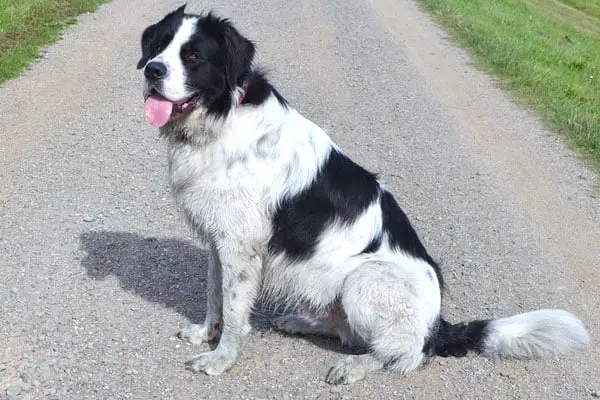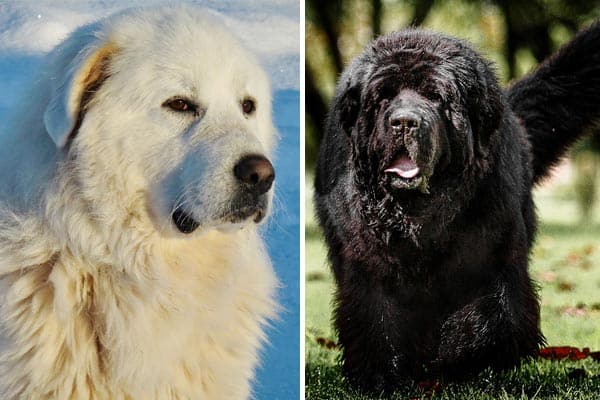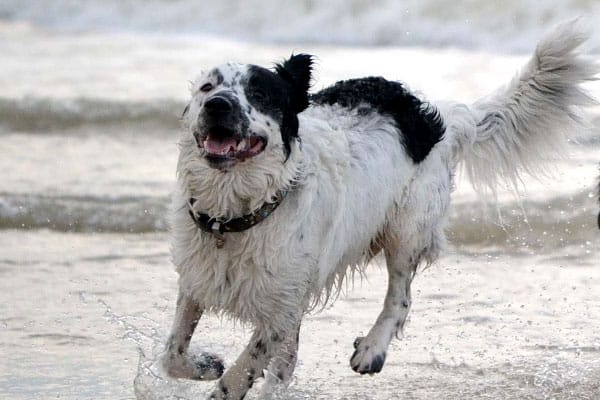How Much Does a Newfoundland Dog Eat: Surprising News About Your Huge Dog’s Appetite

Many aspiring Newfoundland dog owners start out their journey by wondering if they have what it takes to properly care for such a sizable companion canine.
One of those worries relates to the Newfoundland dog’s appetite and the cost of providing food for this breed of dog.
This is a great question to ask if you are considering whether to add a Newfoundland dog to your family. After all, you don’t want to make a decision that will stress you or your budget out.
In this article, we talk specifics about how much Newfoundland dogs typically eat in puppyhood, in adulthood, and in the senior dog years.
How Much Does a Newfoundland Dog Eat?
As the Newfoundland Dog Club of America points out, Newfoundland dogs actually eat a surprisingly modest amount given their enormous size.
Club officials report that a typical meal for a Newfoundland puppy is two cups of kibble three times per day. Adult Newfoundland dogs eat scarcely more than that. Two to three cups of kibble twice per day are quite normal for daily meals.
Learn More About the Amazing Newfoundland Dog Breed
This short, fun YouTube video from Animal Planet showcases some of the many unique traits, qualities, and stories about the Newfoundland dog breed.
While size is one of the most immediately obvious larger-than-life qualities about the Newfie, as fans and owners have nicknamed this dog breed, it is far from the only trait that makes these dogs so special.
Calculating the Average Cost of Feeding a Newfoundland Dog
As NCA Newfs explains, the brand and type of dog food you choose to offer your Newfoundland is going to have an impact on the monthly cost of your dog’s meals.
This will also change throughout life since your Newfoundland puppy will need to eat an appropriate large to giant-size puppy food (as opposed to an “all breeds” or small breed puppy food).
You may also decide to transition your Newfoundland to a senior dog food later in life to compensate for a less active dog and keep your Newf’s weight in check.
An example would be if you decide to feed your Newfoundland a whole and complete dry kibble dog food.
One 40-pound bag of good quality giant breed dog food will yield approximately one month of servings if you are feeding two cups per day in the morning and at night.
Depending on the brand you choose, you may pay anywhere from $15 to $60 and up for a month’s supply of dog food.
Then you will also need to budget for training treats and any other healthy treat foods you want to offer your dog.
So as you can see, it really isn’t any more expensive to feed a Newfoundland dog than it would be to feed a different dog breed that was smaller in size.
This would be consistent even if you decided to feed a different type of diet such as raw, grain-free, or homemade since the amount of daily food required isn’t much more than a smaller dog breed might require.
How Can Newfoundland Dogs Be So Big And Eat So Little?
This is a big question!
For a dog breed that the American Kennel Club (AKC) reports can easily weigh 150+ pounds in adulthood, you would think these dogs would need a lot more daily calories to stay healthy.
However, as the Newfoundland Club of the UK explains, there is actually a health danger associated with over-feeding a Newfoundland puppy or adult dog.
Specifically, if your Newfie puppy grows too heavy too fast, this can place a potentially damaging amount of pressure on growing bones and joints, leading to lifelong structural damage.
The goal is for your puppy to put on no more than three to four pounds per week (1.5 to 2 kg per week) until your dog reaches the age of six months.
You can tell your dog is too heavy if you cannot feel the slight indentation of the rib cage when you palpate the chest area. If you need help checking your dog’s weight in this way, ask your veterinarian for a demonstration.
Choose the Best Dog Food You Can Comfortably Budget For
If you are going to be caring for a companion canine for the first time, it is worth pointing out here that not all dog foods are created equally.
There can be a sharp learning curve in this area for a brand-new dog owner.
As Newfoundland Puppies of Umfleet Farms breeders explains, the better the puppy food or dog food you offer, the less of it your dog will need to eat to stay healthy.
Just as when people tend to gain weight yet feel hungrier when they eat so-called “junk” food that is heavily processed, packed with fillers, and loaded with artificial flavor enhancers, so too will a dog tend to eat more when the food is low-quality.
A high-quality canine food that is formulated as a whole and complete nutrition for the size of your dog should deliver a complete food source with every bite. There should not be a need for any supplements unless your veterinarian specifically indicates this.
Identifying the Right Nutrient Ratio for a Newfoundland Dog to Eat
For a large to giant breed of dog like the Newfoundland dog, you want to aim for a particular ratio of nutrients to avoid unbalanced or too-fast growth.
Newfoundland puppy nutrition recommendations
For Newfoundland puppies, the Umfleet Farms breeder recommends aiming for 28 to 29 percent protein content in puppy food.
Also, be extra-sure the food you buy is a puppy food formulated for large to giant size puppies.
Typically, you will be feeding this special puppy food blend at least until your Newfie reaches the age of six months. After your dog turns six months old, you can start the transition to a suitable large to giant dog breed adult food.
However, as ShireBears Newfoundlands breeder points out, if for some reason your puppy starts growing too fast, you may need to switch to the adult dog food earlier to slow down your dog’s growth to a safe pace.
Newfoundland adult dog nutrition recommendations
For Newfoundland adult dogs, you want to aim for no more than 23 to 24 percent protein content.
And here again, you want to be sure you are feeding a whole and complete adult dog food that is specifically formulated for large to giant size dog breeds.
Newfoundland senior dog nutrition recommendations
If you want to transition your older Newfoundland dog to senior dog food, all of the same would hold true.
This can be especially the case for senior dog foods since often large to giant size dogs begin to have more difficulty with joints and movement in the later years of life.
Large and giant dog breed foods will often contain special supplementation to help ease structural aches and pains associated with these dogs’ large size.
Potential Dog Food Allergies in Newfoundland Dogs
As ShireBears Newfoundlands breeder explains, Newfoundland dogs may look so large and imposing that they seem invincible, but they can actually be quite vulnerable to food allergies.
Many Newfoundland dogs are sensitive to food additives, fillers made of grain, soy, dairy, and other items that are commonly added to many cheap or “boutique” dog foods today.
When a Newfoundland dog develops food allergies, one of the most common places you will see symptoms actually is in the skin and coat.
As Newf Friends Rescue charity explains, treatment-resistant ear infections, skin rashes, coat loss, dermatitis, and other conditions can all arise from allergies to ingredients in your dog’s food.
Gastric Dilatation in Newfoundland Dogs
Avoiding (or treating) food allergies and too-rapid growth are not the only potential health issues you will face as you care for a growing Newfoundland dog.
As the Animal Health Center of New Hampshire points out, like many other large, deep-chested dog breeds, Newfoundland dogs are particularly vulnerable to a condition called bloat (gastric dilatation or volvulus).
Bloat most commonly occurs when the dog has some type of vigorous activity and then immediately drinks a large quantity of water or eats a meal.
With bloat, the stomach constricts and twists so that it fills with gas. This condition is often fatal even if the dog is rushed to the veterinary emergency room and gets prompt treatment.
You can ask your veterinarian about a minor surgery that can prevent your Newfie from ever having bloat.
Typically this surgery is done at the same time your dog is neutered or spayed, so until then, you will have to closely monitor how much your dog eats and drinks as well as how fast they eat and drink.
For your dog’s safety, always time meals and water away from playtime and exercise. Make sure to offer your dog’s meals in a puzzle feeder or slow feeder to keep your Newfie from gulping down the food and ingesting a dangerous quantity of air.
Newfoundland Dogs Have Only Moderate Energy Levels
While the American Kennel Club (AKC) classifies the Newfoundland dog as a working dog, these dogs actually have a surprisingly moderate energy level.
They are known to be sweet-tempered, loyal, and gentle, especially with children. Their special work abilities include drafting (hauling) and carting. They are excellent swimmers and have a long history of working as water rescue dogs.
Because the Newfoundland is a working dog breed, these dogs do have the thick, double-layer working-dog coat that most working group dogs have.
The inner coat layer is very soft and thick and is heavily insulating. This layer can keep the dog warm in freezing cold temperatures on land or in the water, where their webbed feet showcase how well the Newfie can really swim.
The outer coat layer consists of longer, coarser guard hairs that are naturally water-resistant. These hairs keep the dog dry and form a barrier against pests, injury, and infection.
But this long, heavy, thick coat can make the Newfoundland appear even larger than they actually are and give the impression they need to eat more than they actually do to stay healthy and energetic.
And the coat definitely adds its own weight when your dog steps on the scale, which is why it is important to learn how to feel your dog’s body through the coat to accurately assess weight gain and weight maintenance.
As VetStreet points out, Newfoundlands are not workaholics like some working dog breeds. Plus, they need and expect to live indoors with their people and enjoy their couch time greatly.
Feeding a Senior Newfoundland Dog
While there are some reports of Newfoundland dogs living well into the double digits, the average life expectancy is between nine and 10 years for most Newfs.
Unfortunately, this shortened life expectancy is quite typical for large and giant size dog breeds. It seems the larger the dog, the faster the aging process kicks in.
As the American Kennel Club (AKC) explains, senior dogs tend to slow down in their activity level, which can require a change in daily calorie intake.
As well, senior dogs often struggle more with arthritis, joint problems, chronic pain, obesity, muscle tissue loss, organ disease, and cognitive issues.
What you don’t want to do is pull back on protein intake. While dogs have evolved to be opportunistic omnivores like their people, dogs need more protein rather than less to at least maintain muscle tissue into old age.
You may also want to choose a senior dog food that contains special joint supplements such as glucosamine and chondroitin and others that your canine veterinarian may recommend. When in doubt, always refer to your dog’s veterinarian for guidance.
Caring for a giant dog breed like the Newfoundland will require many adjustments to accommodate your dog’s large size, but surprisingly, daily diet isn’t one of those.



